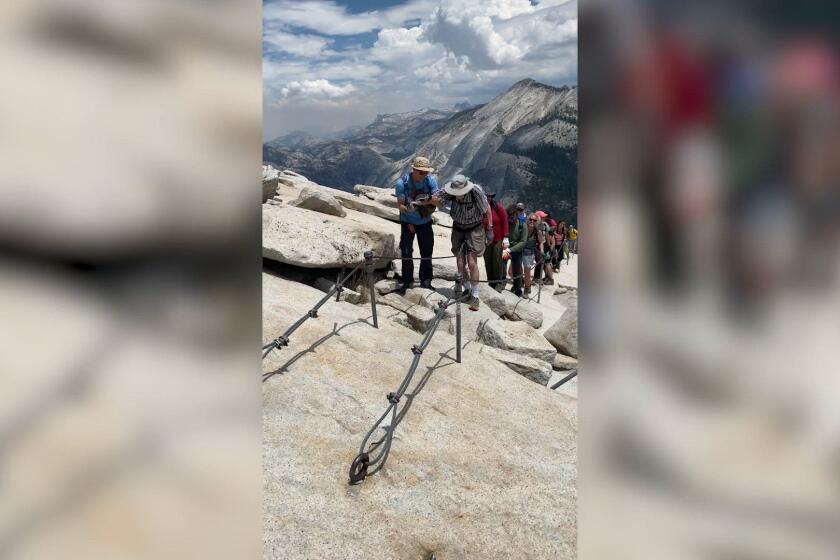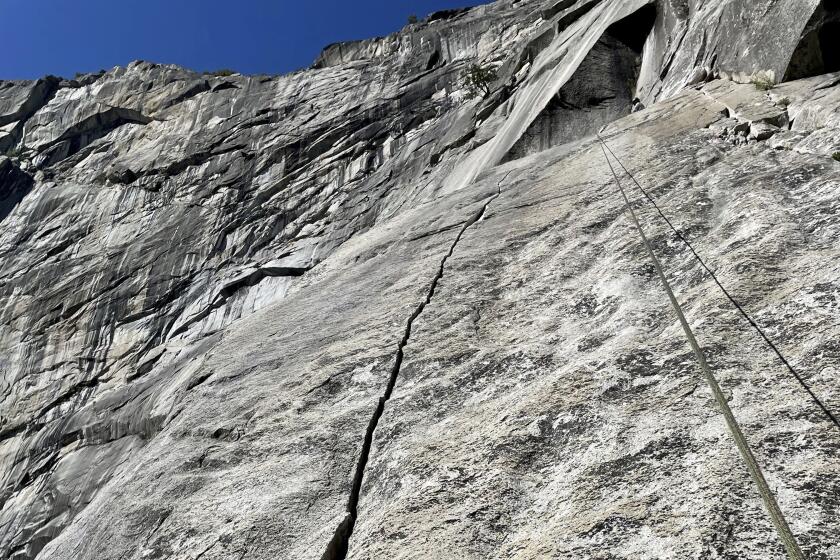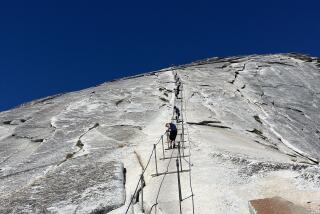Air Force flight instructor made splint out of sticks to rescue hiker on Yosemite’s Half Dome

- Share via
With cold wind and hail whipping up near the summit of Half Dome in Yosemite National Park, U.S. Air Force flight instructor Joshua Haveman could tell that the other hikers trying to reach the 8,800-foot peak were struggling, especially on the last several hundred feet to the top.
That’s when someone screamed, and Haveman watched as a hiker slid about 80 feet and landed on a thin rock ledge, narrowly avoiding a fall farther down the mountain. Haveman could see that the man was injured by the way his legs were angled, so he started to gather sticks to fashion a makeshift splint that was used to stabilize the hiker for his trek back down the mountain.
Haveman’s rescue of the injured hiker on Sept. 2 earned the praise last week of his Air Force base, which issued a news release, calling the instructor an “everyday hero” who demonstrated “extraordinary bravery and resourcefulness during a perilous rescue.”
In the past six years, three people have been killed trying to summit the peak, including two people who died in the summer of 2019. A spokesperson for the National Park Service did not disclose the condition of the injured hiker.
Everett Kalin, a 93-year-old retired seminary professor from Oakland, went viral with a video of him reaching the top of Half Dome in Yosemite National Park.
Hikers who make their way to the top of Half Dome rely on a cable-suspension system to help with the last leg of the climb — a steep trudge up a slick and sheer granite surface.
Haveman, a flight instructor with the 60th Air Evacuation Squadron, could tell that the other hikers on the mountain were desperate to get out of the elements as they rushed on the cable-assisted system, according to the news release.
Anticipating an accident or injury, Haveman put down his bag, pulled out a medical kit and headed in the direction of the other hikers. Moments later, he watched the hiker fall.
“Other climbers were concerned for my safety, but the guy was just up there screaming in pain, so I left the cable area and climbed onthe ledge,” Haveman said.
When he reached the hiker, he secured the splint above and below the man’s shin and wrapped his ankle in a bandage, according the news release from Travis Air Force Base. Haveman also covered the man with his coat and instructed other people on the mountain to contact authorities. A few minutes later, a park ranger arrived to help the hiker down the cable system and administered care for shock, according to the news release.
Rock climbers recently spotted the crack, reportedly 200 feet long, on the western side of the Royal Arches, Yosemite National Park officials said.
Another park ranger arrived with a medical bag and the hiker was stabilized with a medical-grade splint, according to Haveman. As the weather improved, other hikers were able to help and put together a pulley system to lower the hiker the last 30 feet to level ground.
That’s when a rescue helicopter arrived to lift the hiker off the mountain, according to Travis Air Force Base.
“I wasn’t sure a helicopter would be able to land with the winds being as strong as they were, so we were preparing to carry him 10 or 12 hours down with a six-man litter,” Haveman said. “Apparently, it was this pilot’s first day on the job, and he was amazing. It took him about 15 minutes, but he was able to sit the chopper down and we were able to get the patient loaded and breathe a sigh of relief.”
The National Park Service said in the incident is under investigation. A spokesperson for the 60th Air Mobility Wing said the Travis Air Force Base news release “describes a personal account of an active accident investigation” and Haveman would not be available for an interview until the investigation is complete.
More to Read
Sign up for Essential California
The most important California stories and recommendations in your inbox every morning.
You may occasionally receive promotional content from the Los Angeles Times.













